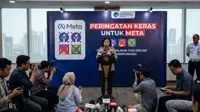Environment ministers of Brazil, South Africa, India, China (BASIC) meeting in Beijing on 25-26 October expressed concern over the global challenge of climate change and its adverse effects, and confirmed their commitments to multilateralism in order to address the issue.
They also pledged to foster climate resilience, promote greenhouse gas emissions reduction and low-carbon and sustainable development, with a view to collectively working towards preparedness of international community for the wellbeing of all.
Ministers underscored that all parties should jointly defend the international system underpinned by the United Nations, in accordance with the principles of equity, common but differentiated responsibilities and respective capabilities (CBDR-RC), in the light of different national circumstances.
“Unilateralism and protectionism undermine the open and free international trade system and the prospect of global economic development and growth, which will end up with damaging global efforts against climate change. It is imperative to focus on safeguarding the multilateral process and the fulfilment of commitments,” says a joint communiqué issued at the meeting.
Ministers emphasised the faithful and comprehensive implementation of the Paris Agreement, in particular of its goals and principles, and underlined the importance of a full, effective and sustained implementation of the United Nations Framework Convention on Climate Change (UNFCCC), its Kyoto Protocol and its Paris Agreement, in accordance with the principles of equity, common but differentiated responsibilities and respective capabilities (CBDR-RC), in the light of different national circumstances, as well as the nationally- determined nature of the Paris Agreement.
The BASIC ministers reaffirmed and emphasised the need for people’s participation and climate friendly lifestyles for addressing the challenge of climate change acknowledging that Paris Agreement embodies and calls for sustainable lifestyles and consumption patterns.
Ministers highlighted that developing countries, including BASIC countries, notwithstanding the multiple challenges including food security, poverty eradication, and insufficient and uneven progress of domestic development, have been implementing ambitious climate action.
In 2018, China has reduced carbon dioxide emissions per unit of GDP by 45.8 per cent from the 2005 level, increased the share of non-fossil fuels in primary energy consumption to 14.3 per cent.
South Africa has recently implemented carbon tax, and announced massive renewable energy programme in its latest electricity plan.
India has already achieved 21 per cent reduction in emission intensity of GDP in 2014 compared to 2005 levels, thereby achieving its pre-2020 voluntary target.
In 2015, Brazil had already achieved a 58 per cent emission reduction in the business as usual scenario set for its NAMAs, thereby overachieving its target of 36- 39 per cent reductions set for 2020.
BASIC countries actively engaged and contributed, and are ready to further strengthen international cooperation to explore solutions which are cost-effective and with lower risks, such as nature-based solutions, and technology innovation in industry transition, they said.
The meeting expressed appreciation for the Polish presidency’s contribution to the conclusion of the bulk of the Paris Agreement Work Programme (PAWP). They appreciated Costa Rica for hosting Pre-COP25 to promote political dialogue on specific issues.
The group pledged their full support to the incoming Chilean Presidency, and highlighted that the key outcome of COP25 will be to conclude negotiations on robust rules to ensure environmental integrity under Article 6 of Paris Agreement and to achieve progress on climate finance which is one of the key enablers for developing countries to implement ambitious climate actions.
They committed to working with all other parties for the success of COP25 in an open and transparent, consensus-based and party- driven manner.
Ministers valued the 187 ratifications of the Paris Agreement to date, called on all remaining parties to ratify, and welcomed the implementation of the agreement in the post-2020 period and urged parties that have not yet ratified the Doha Amendment to do so as soon as possible, striving for its prompt entry into force before COP25.
The Group highlighted the substantial gaps not only in mitigation, but also in adaptation and support provided by developed countries to developing countries in the pre-2020 period.
Ministers underscored that as developing countries are the most adversely affected by climate change, adaptation is a key imperative but is neglected with imbalanced allocation of resources compared to mitigation. They reiterated that balanced allocation should be made for adaptation and mitigation in terms of support provided by developed countries, including through Green Climate Fund (GCF). The Group encouraged other fora, including the Global Commission on Adaptation to play their part in supporting developing countries on adaptation. They emphasised that it is critical to dedicate a share of proceeds from ITMOs transactions under Article 6 to fund adaptation in developing countries.
They urged developed countries to fulfil their climate finance commitments of providing $100 billion annually by 2020 for developing countries in a transparent and grant-based manner.
Ministers noted with concern the significant gap in aspects including funding scale, eligibility and policy- making of the GCF and the Global Environment Facility (GEF) from the need of developing countries. They noted of the contributions made by some developed countries in the first replenishment of the GCF, and urged the other developed countries to make speedy and robust contributions, to ensure the first replenishment doubles the initial resource mobilization pledge in real terms.
Ministers reiterated that the UNFCCC process remains the preeminent international forum for addressing matters related to climate change, and other fora serve as contributory supplement under the guidance of its principles and spirit. Ministers noted the work of International Maritime Organization (IMO) and International Civil Aviation (ICAO) on reduction of GHG emissions, and underlined that the work being undertaken must comply with the key principles of the UNFCCC process, in particular the principle of Equity and CBDR-RC.
Ministers welcomed the offer of India to host the 30th BASIC Ministerial Meeting.


















